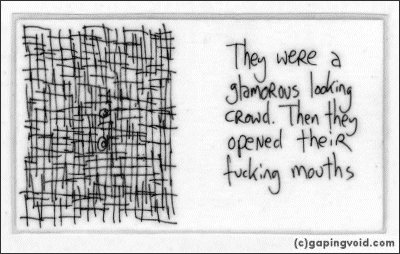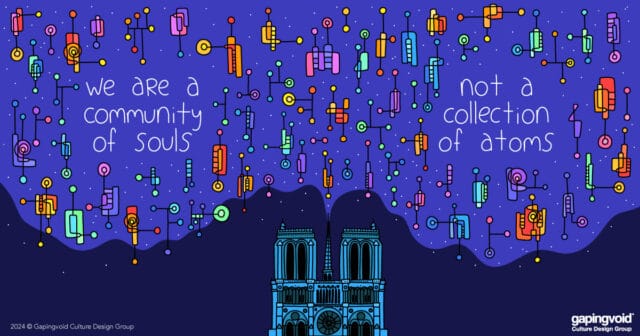
In my previous post, “Applying ‘Creativity’ To Your Professional Life”, I offered some advice to a young friend of mine who’s only been in the working world a short while.
2. I had no life in my 20’s. Get used to the same. While my peers were partying or zoning out to TV sitcoms, after work I’d head for the coffee shop or the bar, and crank out cartoons until bedtime. Sure, I must have looked a real lonely, “no-life” saddo, sitting there doodling away, but at the time I didn’t really care. I seriously enjoyed doing it, plus I knew I was on to something. Besides, the typical twentysomething TV-and-Budweiser-enhanced nighttime existence didn’t interest me too much. ‘Tis more blessed to make than to consume etc.
I think this second point warrants further discussion [N.B. This isn’t a definitive post. It’s just me thinking out loud.].
One thing you notice about twentysomethings who are doing exceptionally “creative” work is, JUST HOW LONG their hours are.
Of course these “creative” types tell you, “That’s because I love what I do.” Of course, that is true, and well done to them for finding a niche which they can truly feel passionate about.
[By the way, I use the word “creative” very loosely, less in the artsy-fartsy context, more in the context of doing something one is passionate about: “Creativity equals Passion” etc. Notice how in the last paragraph, I put the word, “creative” in inverted commas, but I didn’t with the word, “passionate”. There was a reason for that.]
But there are other realities about getting to do something “creative” for a living.
1. It’s a great privilege. So there’s a lot of other folk chasing after the same prize, and the barriers to entry are high. My first job in advertising, I had to beat out 300 other college grads in order to land it. When all I thought I had to do before that was be in the top 20% of my class at school, those odds seemed pretty hardcore.
2. “Creativity” is extremely time consuming. My cartoons didn’t get any good [to me, at least] until I had spent well over a decade working obsessively on them. Hell, I’m still not there yet.
3. When you get into the “creative” zone, the lines between “work time” and “off time” start getting blurry. And the deeper you get into that zone, the blurrier the lines get. I often work from seven in the morning till midnight and think nothing of it. A very smart friend of mine who works over at Blip.tv once told me, “I only work 3 or 4 hours a week. The rest of the time, I’m playing.” Working eighty hour weeks is much easier and sustainable when seventy-six of those hours is playtime for you.
4. The thing that turns a job into passion, that turns work into play, is a sense of mission. When you’ve got a real sense of purpose, the lines that separate work and play evaporate. So instead of thinking about how “creative” or “uncreative” your job is, ask yourself what “purpose-idea” your job is articulating.
5. A “purpose-idea” just doesn’t land on your lap because you’re lucky, smart and good-looking. A sense of purpose only comes your way usually because you’ve been working your ass off over a long period of time, intensely cultivating it. And yeah, sometimes that will appear to more mainstream people as “Having no life”. To hell with them. They don’t know or care about you. Successful people get to where they are by doing the stuff that unsuccessful people aren’t willing to do. Harsh but true.
[NB. The term, “Purpose-Idea” was originally coined by my good-friend-and-marketing-genius, Mark Earls.]
[Update:] Stowe Boyd kindly provides some REALLY GOOD thoughts on the subject:
Paderewski, the physicist, once said, “Before I was a genius, I was a drudge.” There is a lot of slogging involved. And others, generally, will not understand: especially before you have invested the full ten years. “You’ll never sell a book!” “You call that music?” “That’s the dumbest design I have ever seen!” “Keep your day job.”
Another good reason to work apart from others, so you don’t have to hear all that negativity. Close the door, and sharpen your pencil.
Like making a fire from rubbing sticks together, creativity’s heat comes from work. Work requires dedication. Dedication involves sacrifice, specifically of time and the absence of what might have been done instead.



